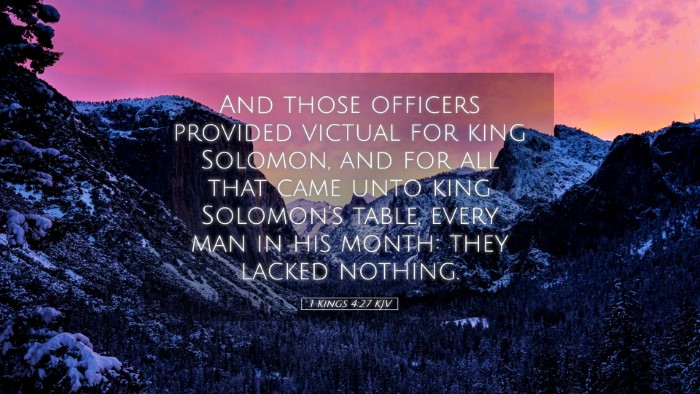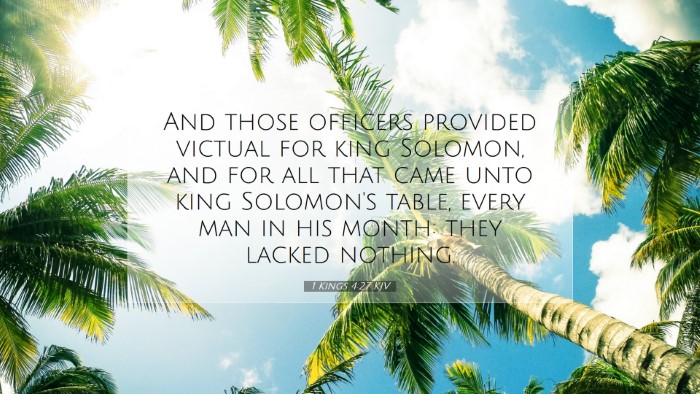Commentary on 1 Kings 4:27
Verse Reference: 1 Kings 4:27 - "And those officers provided victual for King Solomon, and for all that came unto King Solomon's table, every man in his month: they let nothing be lacking."
Introduction
The passage in 1 Kings 4:27 serves as an illustration of the administrative prowess and the lavish provisions made during King Solomon's reign. This verse highlights the efficiency of Solomon's officers and their role in ensuring that the king's household was well supplied, which reflects the broader themes of governance, abundance, and divine order present throughout the narrative of Solomon's rule.
Key Themes
- The Organization of Government: Solomon's ability to govern a vast kingdom is showcased through the systematic arrangement of his officials who were responsible for providing food.
- Provision and Abundance: The assurance that nothing was lacking underscores God's provision in Solomon’s reign, echoing God's promise to bless those who follow Him.
- Responsibility and Order: The phrase "every man in his month" indicates a meticulously organized system of supply, reflecting good stewardship and the importance of fulfilling one's responsibilities.
Commentary Insights
Matthew Henry's Commentary
Matthew Henry emphasizes the significance of divine providence in the management of King Solomon’s court. He reflects that the officers’ roles symbolize the cooperative effort required in governance, highlighting that their diligent management ensured that the royal table was never lacking in sustenance. This not only displays the wealth of the kingdom but also the care and commitment expected from those in positions of authority.
Albert Barnes' Commentary
Albert Barnes points out the administrative skill embodied in this verse, characterizing Solomon's appointments of officers as a model for effective leadership. He notes that the officers were not merely figures of authority but held vital roles that ensured the community's well-being. Barnes believes the verse underscores a historical moment where the fruits of prosperity were enjoyed by many, getting a glimpse into how Solomon’s reign resulted in a flourishing nation.
Adam Clarke's Commentary
Adam Clarke provides a detailed look at the structure of governmental support under Solomon. He emphasizes the practical aspects of the officers’ responsibilities and the logistics involved in supplying the royal household. Clarke interprets this arrangement as a reflection of God’s favor upon Solomon, where success was achieved through both divine blessing and human diligence. He also suggests that this system was a precursor to later administrative reforms in the kingdom.
Practical Applications
- Leadership and Responsibility: For pastors and leaders, this passage serves as a reminder of the importance of organization and responsibility in ministry. Just as Solomon's officers ensured that needs were met, church leaders must be diligent in fulfilling their roles.
- Trust in Divine Provision: The assurance that nothing was lacking can inspire faith in God's provision. Believers are encouraged to trust in God’s ability to supply all needs when they are obedient to His call.
- Community and Cooperation: This verse teaches the value of working together in service. In a church context, it reflects how each member has a role in contributing to the overall health and prosperity of the body of Christ.
Conclusion
In conclusion, 1 Kings 4:27 encapsulates a moment in Israel’s history marked by administrative efficiency, divine provision, and the blessings of God upon a united and thriving kingdom. For pastors, scholars, and students of the Word, this passage offers profound insights into the nature of leadership, stewardship, and the biblical principle of working together to achieve common goals. It beckons church leaders to seek out God’s guidance as they fulfill their responsibilities, ensuring that their congregations are adequately served.


